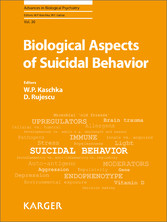Suchen und Finden
Biological Aspects of Suicidal Behavior
Suicide is one of the most important causes of death in modern societies. To develop more effective preventive measures, we have to be aware of and learn more about its neurobiological foundations. In recent years, the tools of modern neurosciences have increasingly been utilized to characterize the pathophysiology of complex human behaviors such as suicide. To improve suicide risk assessment and suicide prevention, a better understanding of its pathophysiology is crucial. This includes research from a variety of disciplines such as neuropsychological, psychosocial and cultural studies but also findings from biochemistry, neuropathology, electrophysiology, immunology, neuroimaging, genetics, and epigenetics. Important results have, for example, been obtained in the field of gene-environment interaction and suicidal behavior. We have just begun to understand how early-life adversity may increase suicide risk by epigenetic mechanisms. Based on such insights, novel therapeutic interventions and preventive measures can be developed. Furthermore, a better understanding of the pathophysiological mechanisms involved in suicidal behavior could reveal the mechanism of compounds like lithium salts. In this book, suicidal behavior and its prevention is discussed by international experts in the light of the most recent results from a broad spectrum of neurosciences.
Alle Preise verstehen sich inklusive der gesetzlichen MwSt.









